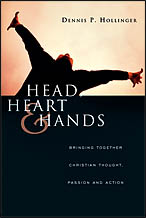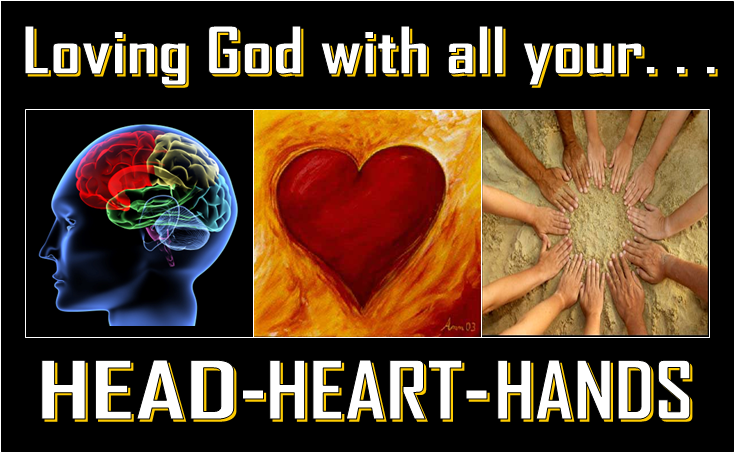
Questions
- Has the balance/relationship of head, heart and hands been explored/discussed in some manner in your field?
- If so, what has been the conversation?
- If not, how might you propose research and writing on the balance/relationship of head, heart and hands in your field?
Interdisciplinary Discussion
The Head, Heart & Hands paradigm does not pursue “integrating faith and learning ’ or working,” instead it recognizes the need for balance between the different components of what makes us human.
“Our minds cannot be brought into harmony with God’s designs and truth without hearts that are near to God and actions that reflect God’s ways. Our hearts cannot experience the presence and power of the Holy Spirit without knowledge of God to guide us and without actions that reflect the fruit of the Holy Spirit. And our actions of both proclamation and presence will wither without a theology to guide them and a heart to drive and sustain them.” (158)
In Chapter 9, Dennis Hollinger offers complementary material from education, social psychology, and philosophy. If you’re from one of these fields, I would love your thoughts on the research/writing of the people mentioned and thoughts of recent research/writing of the balance/relationship of head, heart and hands. If you’re from a field not mentioned below, what do you have to bring to the table?
- Education: learning is not all about just using the head. It is about engaging the whole individual – what the learner is and feels and what he/she does.
- Johann Heinrich Pestalozzi (1746-1827) highlighted intellectual, moral and physical as the elements of education in his pioneering work with children.
- Howard Gardner (b.1943, professor of cognition and education at Harvard and an adjunct professor of neurology at Boston University School of Medicine): “theory of multiple intelligences challenges the traditional view that intelligence is essentially a singular capacity that can be measured by IQ tests” (104).
- Social Psychology: the impact of beliefs and actions are intertwined.
- David Myers (b.1942, professor of psychology at Hope College, MI): “’ we are not only as likely to think ourselves into a way of acting but also to act ourselves into a way of thinking.”
- Ian Charleson (1949-1990) deeply affected by his role as Eric Liddell (1902 – 1945) in Chariots of Fire (1981).
- Frederick Douglass‘ (1818 -1895) illustration of the well-intended slave mistress.
- Philosophy: our belief systems necessarily impacts what we can know and how we respond to what we find.
- Thomas Aquinas (1125-1274): Hollinger concludes by commenting, “Though a rationalist, he attends to other dimensions of the human person. Moreover, he allows for the heart dimension and our bodily actions to play a role in understanding and carrying out that understanding, as long as they do not contradict true reason. Thus, in a modified form Aquinas allows for the interplay of head, heart and hands” (171).
- Michael Polanyi (1891 – 1976) notes that one cannot be without a belief system in scientific discovery or “objective.” One’s investigative framework and discoveries shape what is pursued for observation and the interpretation of what is observed.
Next in series: Head, Heart and Hands Together: Implications and Challenges (Chapter 10)
*Drawn from an adult elective based upon Dennis Hollinger‘s “Head, Heart & Hands: Bringing Together Christian Thought, Passion and Action” (InterVarsity Press, 2005). Kevin Milligan facilitated the class at Elizabethtown Brethren in Christ Church. Note: See the first post in the series for more on the genesis of this study guide as part of a local Emerging Scholars Network partnership (South Central Scholars Network PA FB and Christian Scholar Series).

Tom enjoys daily conversations regarding living out the Biblical Story with his wife Theresa and their four girls, around the block, at Elizabethtown Brethren in Christ Church (where he teaches adult electives and co-leads a small group), among healthcare professionals as the Northeast Regional Director for the Christian Medical & Dental Associations (CMDA), and in higher ed as a volunteer with the Emerging Scholars Network (ESN). For a number of years, the Christian Medical Society / CMDA at Penn State College of Medicine was the hub of his ministry with CMDA. Note: Tom served with InterVarsity Christian Fellowship / USA for 20+ years, including 6+ years as the Associate Director of ESN. He has written for the ESN blog from its launch in August 2008. He has studied Biology (B.S.), Higher Education (M.A.), Spiritual Direction (Certificate), Spiritual Formation (M.A.R.), Ministry to Emerging Generations (D.Min.). To God be the glory!

Re. Head, Heart, Hands in my field (music.)
Ooooh, I could write a book (don’t tempt me) on how integrated the mind, spirit (emotions) and body are in playing/singing, conducting and even composing music. That’s all music, not just sacred that is consciously God-inspired-and/or-directed.
My last violin teacher reminded me repeatedly to keep a cool head (rational, detached mind) while my heart was hot so my body would maintain control of the technical performance actions.
Music Psychology is relatively new, correlating to brain imagery techniques, but is apparently exploding in this century. The heart and music have forever been linked. And some pedagogical books discuss how each muscle, bone and tendon work in playing certain instruments.
Thank-you Rebecca! Would love to learn more as my girls love music — one (11 years old) is richly enjoys violin & guitar 🙂 Do you have a particular article, weblink, or book to recommend?
Well, since you asked—
I have read some of these and just skimmed others.
A fantastic “grownup” book, “What Every Violinist Needs to Know About the Body” will help your daughter fix any bad habits later if she stays with it.
Here’s a few articles and books (in no particular order):
Kempter, Susan. How Muscles Learn: Teaching the Violin with the Body in Mind, 2003.
http://www.learninghowtoplaytheviolin.com/violin-children-benefits-of-music-education.html
http://eric.ed.gov/ERICWebPortal/detail?accno=EJ447189
Coats, S. (2009). Bringing Music to Life. American Music Teacher, 59(2), 50. Retrieved from EBSCOhost.
http://atonal.ucdavis.edu/people/
Deutsch, Diana, ed. The Psychology of Music. New York: The Academic Press, 1982.
If music be the food of love. By: Isaacs, David. Journal of Paediatrics & Child Health, Jul2011, Vol. 47 Issue 7,
p403-404, 2p; DOI: 10.1111/j.1440-1754.2011.02137.x
Karr, G.(2009).Can You feel it?. Strad, 120(1430), 24-28
–great article for string players! and a great pub.
Listed below is the required reading for my Music Aesthetics undergrad capstone course in 2005. (We synthesized all the books’ concepts into one paper.) That professor is the head of the Composition Studio at my university and presently my academic mentor. a lot of reading but worthwhile if you ever have the time.(The paper emailed by request)
Barzun, Jacques. Music into Words. Washington, D.C.: The Library of Congress, 1953.
Busoni, Ferruccio. “Sketch of a new esthetic of music.” In Three Classics in the Aesthetic of Music. New York: Dover Publications, 1962, 73-102.
Cooke, Deryck. The Language of Music. New York: Oxford University Press, 1959.
Davison, Archibald T. Words and Music. Washington, D.C.: The Library of Congress, 1953.
Debussy, Claude. “Monsieur Croche the dilettante hater.” In Three Classics in the Aesthetic of Music. New York: Dover Publications, 1962, 1-71.
Hanslick, Eduard. On the Musically Beautiful. Geoffrey Payzant, trans. and editor. Indianapolis, Indiana: Hackett Publishing Co., 1986.
Haydon, Glen. On the Meaning of Music. Washington, D.C.: Library of Congress, 1948.
Langer, Susanne K. Philosophy in a New Key. New York: New American Library, 1942.
Meyer, Leonard B. Emotion and Meaning in Music. Chicago: University of Chicago Press, 1956.
Meyer, Leonard B. Music, the Arts, and Ideas. Chicago: University of Chicago Press, 1967.
Pratt, Carroll C. Music as the Language of Emotion. Washington, D.C.: Library of Congress,1952.
Sessions, Roger. The Musical Experience of the Composer, Performer, Listener. Princeton, New Jersey: Princeton University Press, 1950.
Small, Christopher. Music, Society, Education. Hanover, New Hampshire: Wesleyan University Press, 1996.
Stravinsky, Igor. Poetics of Music. English translation by Arthur Knodell and Ingolf Dahl. Pref. by George Seferis. Cambridge: Harvard University Press, 1970.
Strunk, W. Oliver. Source Readings in Music History from Classical Antiquity Through the Romantic Era. New York: W. W. Norton, 1950.
Tame, David. The Secret Power of Music. Rochester, Vermont: Destiny Books, 1984.
Wow! Thank-you for sharing this rich reading list with ESN. I’ve noted the violin title. Any other materials which strike you as a good match for a novice such as myself?
Comment: Isn’t ESN a blast? Love the opportunity to be part of this para-academy endeavor/ministry. I learn so much.
While we’re on the topic of music, I’ll plug my wife’s work with Musikgarten, which includes a series of classes called God’s Children Sing.
Mars Hill Audio also recently featured a fascinating interview with Christopher Page about his new book, The Christian West and Its Singers: The First Thousand Years. Page made the point that part of the power of choral singing is that the choir breathes with one breath.
What ages is Musikgarten geared to? I know Kindermusic is for tiny tots.
Thanks for the ref. to choral singing. Our orchestra conductor teaches us string players to “sniff” together on preparatory beats!
Musikgarten was actually started by the same people as Kindermusic (long story). Same age groups – birth to age 7 – with a bit more emphasis on the natural world and child development.
Interesting discussion here!
I was a music major in undergrad and am now a neuroscience PhD student, so maybe have an unique perspective for you here.
On the music end, I recently performed a recital at a music festival that centers around exploring how one’s faith as a Christian shapes musical communication and performance. How does our understanding of God and Jesus inform our portrayal and interpretation of seemingly-secular music? How do we use the temple that is our bodies to construct musical worship in a way that glorifies God through both soul and mind? You can find some resources here: http://www.laskersummermusicfestival.org/
As for music and the brain, the research is mixed. I come from a cellular and molecular background, so obviously the question is hard to examine on that level. But there are several good resources that I have enjoyed in exploring how my body and mind interact through the medium of music. Most famously:
Musicophilia (Sacks): http://www.ebook3000.com/muisc/Oliver-Sacks—Musicophilia–Tales-of-Music-and-the-Brain_92524.html
This is your Brain on Music: http://www.amazon.com/This-Your-Brain-Music-Obsession/dp/0525949690
Also perhaps of relevance, my husband is a clinical psychologist who researches the roles of forgiveness and hope in modulating suicidal ideation. The idea is that if therapists can encourage and tap into these spiritual concepts in the context of therapy, they may see quantifiable improvement in those contemplating suicide.
Hopefully these titbits are both relevant and interesting to you!